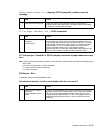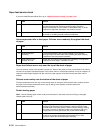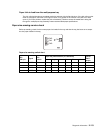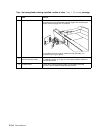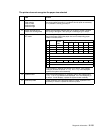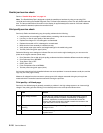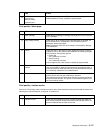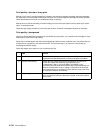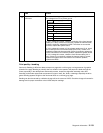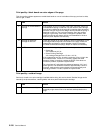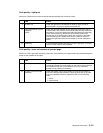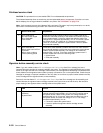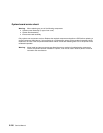
Diagnostic information 2-119
Print quality—banding
Service tip: Banding is difficult to detect, except on a page with a uniform gray or a large amount of graphics
printed on the page. Banding is primarily due to a variation in the speed of the paper as it feeds through the
printer, especially in the development and transfer process. Inspect the alignment assembly, main drive
assembly, and all other paper feed components for signs of wear, dirt, binds, or damage, especially the drive
gears. Banding appears as light or dark horizontal lines on a uniformly gray page.
Banding can also be caused by a defective charge roll brush contact or HVPS. Check the charge roll contact for
damage and for proper connection to the HVPS and print cartridge.
4
System board HVPS
connector
Check the following voltages at J15 on the system board. Measure
the voltages from J15 to printer ground.
If J15-1 voltage is incorrect, check the continuity of the front harness
cable (J15-1 line). If there is no continuity, replace the harness cable.
If there is continuity, replace the HVPS. If this does not correct the
problem, replace the system board.
If J15-2 voltage is incorrect or if the voltage remains at 0 V dc, check
the continuity of the front harness cable (J15-2 line). If there is no
continuity, replace the harness cable. If there is continuity, replace the
HVPS. If this does not correct the problem, replace the system board.
If J15-4 voltage is incorrect, check the front harness cable (J15-3
line). If there is not continuity, replace the harness cable. If correct,
replace the system board. If this does not correct the problem,
replace the HVPS.
FRU Action
Pin J15 Voltage (approximate)
Printer idle
J15-1 0 V dc
J15-2 +4 V dc
J15-4 0 V dc
Printer printing
J15-1 0 V dc to +5 V dc
J15-2 0 V dc to +4 V dc
J15-4 0 V dc to +1.9 V dc



